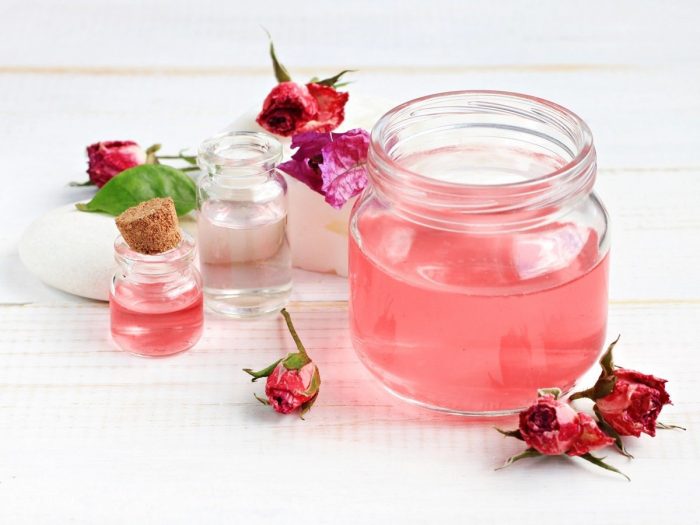Rose water is an ancient substance that has medicinal, cultural, religious, and nutritional significance around the world.
What is Rose Water?
Roses are considered one of the most fragrant and beautiful flowers, and there have been many attributes given to these flowers throughout history. As it turns out, roses do contain many antioxidants, volatile compounds, and organic acids that make it highly sought after and effective as a natural remedy.
Rose water can be consumed, although it is most commonly known as a part of perfumes or other cosmetic products. Even today, this water is used in various ways around the world, and many of the health benefits it can provide are undeniable. Many of these benefits can be attributed to its content of citronellol, geraniol, linalool, nerol, and other aromatic and volatile compounds. Rather than chemically altered or unnatural perfumes, this natural and beautiful scented water can be a game-changing choice when used properly. [1]

The fragrant rose water contains many benefits. Photo Credit: Shutterstock
Rose Water Benefits
Rose water, with its amazing anti-inflammatory properties, helps soothe skin irritation, reduce redness, promote anti-aging, relieve headaches, and protect against infections, among others.
Skin Irritation
If your skin is regularly irritated, it could be a sign of chronic inflammation, or a condition of rosacea, psoriasis or eczema. The anti-inflammatory compounds in rose water can help to eliminate this discomfort and speed the healing process with its anti-oxidant compounds. [2]
Skin Redness
The immune system acts in all parts of the body, but in some cases, you want to suppress that activity – or make it more efficient. This water can help to eliminate the swelling and redness of inflammation, returning the skin on your face, neck or chest to its normal color. [3]
Infections
Roses contain certain volatile compounds that are known to have antibacterial properties. This makes this sweet-smelling water a great way to protect the immune system and prevent infections and pathogens from attacking the body’s largest organ. [4]
Anti-Aging
Some of the active ingredients in rose water are antioxidant in nature, meaning that they can seek out free radicals and neutralize them before they can do serious damage. In terms of anti-aging effects on the skin, the regular use of this water can help to prevent the appearance of wrinkles, age spots, and blemishes. [5]
Mood Booster
The aromatic compounds found in rose water have been linked to affecting hormonal levels, including neurotransmitters in the brain. The aroma of this water, as a perfume or in a cosmetic product, can help to elevate mood and relieve symptoms of depression. This can also help in the treatment of headaches. [6]
Stomach Issues
Consuming rose water in small amounts has been linked to improved digestive function and gastrointestinal health. This can mean a reduction in constipation and other inflammatory conditions. [7]
Hair Health
Many people use rose water in hair masks, which can help to soothe inflammation on the scalp, which can cause problems like dandruff and hair loss. It can also strengthen hair, improve texture and luster, and help eliminate split ends. [8]
Sore-throat
The anti-inflammatory nature of this water can even help respiratory issues by soothing sore throats and mitigating the need to cough. This can allow for the healing of the respiratory tracts, while the water also seeks out the underlying infection.
Rose Water Uses
Rose water has been used in many ways throughout history and is still used in various creative manners, including as a hair mask, a facial cleanser, a facial toner, a makeup remover, a moisturizer, and an antibiotic topical ointment. Rose water can be mixed with many other creams, salves, and carrier oils, where it can be delivered to lower layers of the skin. Rose water is also consumed in recipes and culinary preparations, particularly if rose water is altered in certain ways, such as adding sugar to it (rose syrup).
